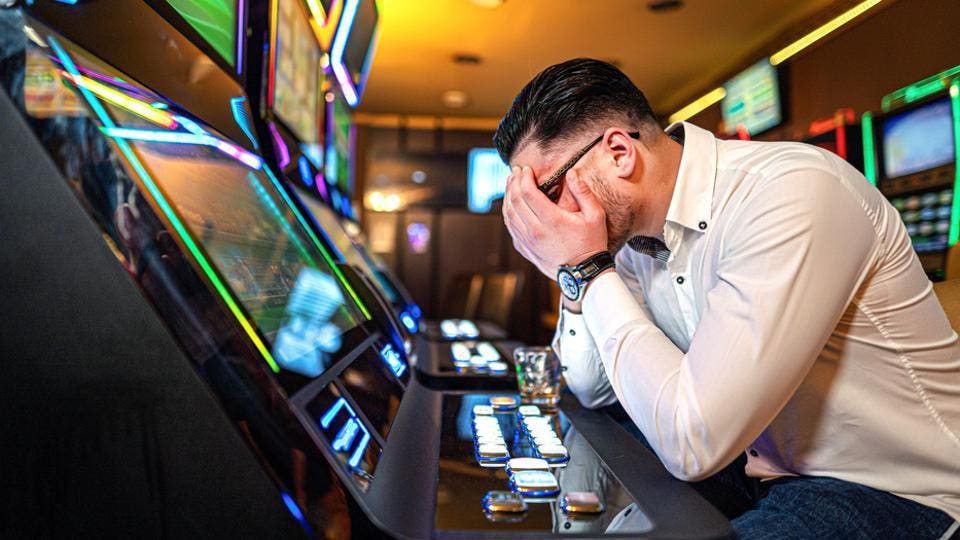
Table of Contents
{{ tocState.toggleTocShowMore ? ‘Show more’ : ‘Show less’ }}
Gambling venues are widespread across the U.S., with some form of legalized gambling available in 48 states, as well as the District of Columbia. Sports betting is also on the rise, with a 2018 Supreme Court decision opening the door for state-to-state legalization of the activity.
While these activities may be enjoyable for some, for individuals with a gambling addiction, visiting a casino or placing sports bets online may result in significant personal and financial distress. In this article, we discuss the basics of gambling addiction, including symptoms, causes and treatments—as well as ways in which family and friends can support a loved one dealing with this condition.
What Causes a Gambling Addiction?
Gambling addiction, or Gambling Disorder (GD), is defined by an uncontrollable urge to engage in gambling activities, despite facing negative consequences or having a desire to stop. It is a recurrent behavioral addiction that may affect an individual’s relationships, finances or professional life. In the U.S. 2 million adults experience severe symptoms of GD.
“Gambling addiction is a complex disorder that can have many different contributing factors,” says Becca Smith, a licensed professional counselor and the chief clinical officer at Basepoint Academy in Dallas. “Ultimately, each person’s experience with gambling addiction is unique and the factors that contribute to it can vary from person to person.”
While there is no known singular cause of gambling addiction, there are several factors that may play a role, says Lin Sternlicht, a licensed mental health counselor, addiction specialist and co-founder of Family Addiction Specialist in New York City. According to Sternlicht, these may include:
- Frequent exposure to gambling
- Underlying mental health conditions, such as depression or anxiety
- Substance abuse
- A predisposition for risk-taking and impulsivity
- Genetics
- Changes in brain chemistry
Signs and Symptoms of a Gambling Addiction
To meet the criteria for gambling addiction, individuals must experience at least four of the following in the span of one year, according to the Diagnostic and Statistical Manual of Mental Disorders, Fifth Edition (DSM-5), a standard text used by mental health providers:
- A preoccupation with gambling
- Inability to stop or control gambling behavior
- Lying about gambling habits
- Increased thrill-seeking when gambling
- Harming relationships due to gambling
- Risking academic or professional prospects because of gambling
- Often turning to gambling when upset
- Seeking help from others to solve financial issues caused by gambling
- Chasing one’s losses, or continuing to gamble after losing money
If you suspect a loved one is grappling with a problem of gambling, keep an eye out for concerning signs, such as:
- Financial struggles, including multiple loans, unpaid bills and frequent requests to borrow money
- Financial losses
- Living without food or everyday essentials
- Substance abuse
- Changes in mental health, such as depression or suicidal ideation
- Withdrawing socially
- Failing professionally or academically
- Relationship conflicts
How Is a Gambling Addiction Diagnosed?
“We don’t need to wait for the addiction to become severe before seeking professional help,” says Smith, adding that the sooner you seek treatment, the greater the likelihood you will experience recovery.
While there are self-assessments available to help individuals determine whether they should seek outside support, only a clinician can formally diagnose gambling addiction. A diagnosis is made using the criteria included in the DSM-5, outlined above.
Gambling Addiction Treatment
“Professional treatment is essential in the recovery process and can help those struggling with gambling addiction gain insight into the underlying causes of their problem and develop healthy coping strategies that can prevent relapse,” explains Smith.
Treatments to address both the gambling addiction and underlying causes may include:
In addition, there are self-help and 12-step programs available, such as Gam-Anon and Gamblers Anonymous, and a National Problem Gambling Hotline to help you find the resources, guidance and support you need.
Supporting a Loved One With a Gambling Addiction
Gambling addiction can put significant pressure on a relationship, says Sternlicht. “[It may cause] erosion of trust, deterioration of communication, low levels of engagement with one another, argumentativeness, minimal expression of feelings, splitting and other divisiveness among family members, resentment and conflict, among other such issues,” she explains.
To help support a loved one dealing with a gambling addiction, Sternlicht advises a four-step approach:
- Active listening: “Simply listening to the addicted individual can be a meaningful form of support,” says Sternlicht. It may also improve your understanding of their struggles and needs, she adds.
- Boundary setting: To support your loved one through addiction, Sternlicht encourages you to cease enabling behaviors, such as paying for expenses or lending money.
- Healthy habits: “Living a healthy lifestyle and engaging in healthy behaviors is the best natural way to reduce unwanted mental health concerns and reduce gambling,” says Sternlicht. She suggests modeling a healthy lifestyle by improving your own sleep hygiene, reducing screen time, eating healthful meals and abstaining from alcohol, drugs and nicotine. Not only will these changes improve your own health, but they may also be a “source of bonding and healing between you and your loved ones,” Sternlicht notes.
- Education: Having a basic understanding of addiction, including its neurological effect, triggers and healthy coping skills may better position you to support your loved one’s healing—as well as your own, says Sternlicht.
If you or a loved one is struggling with a gambling addiction, Smith offers a measure of hope. “For those dealing with it, know that recovery is possible with the right tools and support,” she says. “Speak with a mental health professional to get the help you need.”
Affordable, Convenient Therapy Anytime, Anywhere
Receive the help you deserve. BetterHelp makes professional therapy available anywhere through a computer, tablet, or smartphone.